
Science fiction literature, often abbreviated as sci-fi, has always been a mirror reflecting the aspirations and anxieties of its time. This genre has traversed a vast landscape—from speculative visions of the future to intricate reimaginings of the past, all while exploring the fundamental questions of human existence. In this post, we will embark on a journey through the evolution of sci-fi, examining key sci-fi novels and influential sci-fi books that have left indelible marks on the fabric of this dynamic genre.
The Beginnings and Classic Science Fiction
The history of science fiction is rich with visionary authors and seminal science fiction works that have shaped not only literature but also our understanding of the world and beyond. One of the earliest milestones in the development of the sci-fi genre is Mary Shelley's "Frankenstein" (1818), which is often credited as the first science fiction novel. It introduced readers to the possibility of reanimating the dead through science, setting a precedent for the genre's preoccupation with scientific advancements.
As we moved into the 20th century, authors like H.G. Wells and Jules Verne further defined classic science fiction with novels such as "The War of the Worlds" and "20,000 Leagues Under the Sea." These books explored revolutionary ideas and laid the groundwork for modern science fiction by combining scientific principles with imaginative storytelling.
The Golden Age and Its Evolution
The mid-20th century heralded what many call the Golden Age of Science Fiction, characterized by works that focused on space exploration, alien encounters, and futuristic technology. This era saw the rise of science fiction authors like Isaac Asimov, whose "Foundation" series not only entertained but also provoked thought about societal organization and scientific responsibility.
During this period, the science fiction themes expanded, reflecting the rapid technological advancements and the political landscapes of the times. Seminal science fiction works such as Robert A. Heinlein's "Stranger in a Strange Land" challenged societal norms and invited readers to reconsider their views on religion and governance.
Modern Science Fiction: Diversifying Narratives
As we transitioned into the late 20th and early 21st centuries, the science fiction genre continued to evolve, embracing complexity in both themes and character development. This era has been marked by a significant broadening of perspectives, incorporating diverse voices and exploring socio-political issues through a sci-fi lens.
Modern science fiction has seen a surge in narratives that wrestle with climate change, identity, and ethics among others. Notable contributions include Octavia Butler's "Parable of the Sower," which paints a grim picture of a dystopian America torn by environmental disasters and social inequalities.
Recent Trends and Media Adaptations
In recent years, science fiction literature has not only dominated bookshelves but has also made significant inroads into film and television. Apple TV+, for instance, has become a notable player in adapting sci-fi literary works into popular shows and movies. Their platform offers an array of titles that showcase the breadth of science fiction themes—from dystopian societies to intergalactic adventures, providing viewers a glimpse into the versatility of the genre.
Furthermore, Sony TV's acquisition of rights for Mira Jacob’s novel "We Killed Anji Alexander" for series development highlights the ongoing trend of translating complex sci-fi novels into accessible visual narratives that reach wider audiences.
Science Fiction Literature in Business and Innovation
Interestingly, science fiction has also found relevance in business and innovation discussions. Articles like "How to Scale a Start-Up" or "20 Tips For Business Leaders To Develop Book Ideas That Stand Out" often draw parallels between entrepreneurial strategies and sci-fi novel impact, suggesting that the imaginative problem-solving featured in science fiction can inspire real-world innovations.
The Impact and Future of Sci-Fi
As we look to the future, the evolution of sci-fi continues to be intertwined with technological advancements and cultural shifts. The impact of seminal science fiction works on contemporary media reminds us that the boundaries of this genre are constantly expanding.
In conclusion, from its origins to its current iterations in various media, science fiction literature remains a crucial lens through which we explore the ever-evolving human condition. As we continue to navigate through uncertainties and technological frontiers, sci-fi will likely play an even more pivotal role in shaping our understanding of what it means to be human in an increasingly complex world.
Thank you for joining me on this exploration through the fascinating landscape of science fiction. May we continue to be inspired, challenged, and entertained by this ever-evolving genre.
Rebecca Field